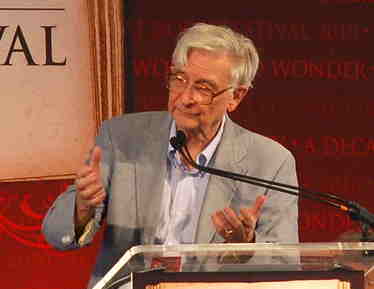Ideology as Biology
By Mark Borrello and David Sepkoski,
The New York Review
| 02. 05. 2022
"E.O. Wilson 5" by afagen is
licensed under CC BY-NC-SA 2.0
The death of renowned biologist Edward O. Wilson in December occasioned an outpouring of appreciation and commemoration appropriate for the passing of a Great Man of Science. Widely beloved for his contributions to the study of ants, biogeography, and biodiversity conservation, Wilson received laudatory obituaries and reflective essays in scientific journals and major newspapers. More than once, he was described as a “modern-day Darwin.” Yet few of his eulogizers cared to dwell on a central preoccupation of his career: the development of the field of “sociobiology” in the mid-1970s, which he defined as the study of the biological aspects of animal behavior. In the years that followed, Wilson became embroiled in a very public controversy over his application of sociobiology to human evolution and behavior. That dispute is very much alive today—and without reckoning with it no account of Wilson’s legacy can be complete.
In 1975, Wilson published a lengthy treatise on the evolution of social behavior in animals titled Sociobiology: The New Synthesis. While Wilson’s primary focus...
Related Articles
By Scott Solomon, The MIT Press Reader | 02.12.2026
Chris Mason is a man in a hurry.
“Sometimes walking from the subway to the lab takes too long, so I’ll start running,” he told me over breakfast at a bistro near his home in Brooklyn on a crisp...
By Katrina Miller, The New York TImes | 02.05.2026
Joseph Yracheta: The Native Biodata Consortium is the first nonprofit data and sample repository within the geographic bounds and legal jurisdiction of an American Indian nation, on the Cheyenne River Sioux Reservation in Eagle Butte, S.D.
NativeBio participated in a ...
By David Jensen, California Stem Cell Report | 02.10.2026
Touchy issues involving accusations that California’s $12 billion gene and stem cell research agency is pushing aside “good science” in favor of new priorities and preferences will be aired again in late March at a public meeting in Sacramento.
The...
By Lauren Hammer Breslow and Vanessa Smith, Bill of Health | 01.28.2026
On Jan. 24, 2026, the New York Times reported that DNA sequences contributed by children and families to support a federal effort to understand adolescent brain development were later co-opted by other researchers and used to publish “race science”...




